CLOSE
Specials
- RegTech Europe
- Financial Risk Management APAC
- Investment Banking APAC
- Corporate Advisory APAC
- Regtech APAC
- Escrow Services
- Digital Banking Latam
- Trading Solutions APAC
- Treasury Management Europe
- CPA Firms Canada
- Financial Risk Management Europe
- Mortgage Broker
- Financial Licensing Europe
- RIA Advisory Europe
- FinTech Canada
- Financial Asset Management APAC
- Investment Banking Canada
- Payment Solution
- Lending Mangment Latam
- Payment Solution Europe
- Broker Dealer Firms Canada
- Alternative Investments Canada
- Financial Fraud
- Investment Management Latam
- Financial Health Europe
- Lending mangment
- Financial Marketing
- Proprietary Trading Europe
- Wealth Management
- FinTech
- Financial Brokerage Firm APAC
- Investment Advisory Europe
- Investment Advisory APAC
- Wealth Management MENA
- Claim Adjusting
- Claim Adjusting APAC
- Mergers and Acquisitions Consulting APAC
- Equipment Financing
- CPA Firms
- Mergers and Acquisitions Consulting Canada
- Investment Services
- Valuation Services Canada
- Wealth Management APAC
- Broker Dealer Firms
- Debt Collection Agencies
- Mergers and Acquisitions Consulting
- FinTech Europe
- Fintech Latam
- Financial Planning / Retirement
- Investment Management
- Financial Compliance
- Digital Banking Europe
- CFO Services
- Debt Collection Agencies Europe
- Wealth Management Europe
- Mergers and Acquisitions Consulting Europe
- Financial Restructuring Europe
- Financial Portfolio Management Canada
- Business Loan
- Payment and Card Latam
- Wealth Management Latam
- Mergers and Acquisitions Consulting Latam
- Tax Advisory Canada
- Trading Solutions Europe
- Alternative Investments
- Digital Insurance Europe
- Investment Services Latam
Weekly Brief
×Be first to read the latest tech news, Industry Leader's Insights, and CIO interviews of medium and large enterprises exclusively from Financial Services Review
Thank you for Subscribing to Financial Services Review Weekly Brief
Implementing Effective Corporate Advisory Strategies in APAC
The Asia-Pacific (APAC) region remains a landscape primed for business expansion. Yet, intricate challenges and significant opportunities lie within this environment.

By
Financial Services Review | Thursday, March 21, 2024
Stay ahead of the industry with exclusive feature stories on the top companies, expert insights and the latest news delivered straight to your inbox. Subscribe today.
The Asia-Pacific region, a hub for economic growth and entrepreneurial opportunities, faces regulatory challenges and technological disruptions, necessitating companies to adapt and leverage expertise.
FREMONT, CA: The Asia-Pacific (APAC) region remains a landscape primed for business expansion. Yet, intricate challenges and significant opportunities lie within this environment. For enterprises navigating this terrain, robust corporate advisory strategies transition from a mere advantage to an imperative.
APAC is a hub for some of the globe's swiftest-growing economies, propelled by an expanding middle class and rising disposable incomes. This growth translates into a substantial consumer base and a flourishing entrepreneurial milieu. Nevertheless, the region contends with many regulatory frameworks, political intricacies, and infrastructural deficits. Moreover, rapid technological advancements continually disrupt conventional industries, necessitating ongoing adaptation efforts.
Today, companies must transcend mere data collection and focus on converting insights into actionable strategies. Effective corporate advisory in the region entails several key components:
Deep Market Understanding: Advisors need a comprehensive understanding of the specific markets where companies operate within APAC. This involves familiarity with cultural nuances, consumer preferences, and regulatory frameworks across the region's diverse economies.
Future-Proofing Strategies: Given the continuous evolution of the APAC landscape, advisors play a critical role in helping companies anticipate future trends, identify potential disruptions, and develop strategies geared toward long-term sustainability.
Data-Driven Decision-Making: While experience remains invaluable, advisors should harness the power of data analytics to offer insights supported by concrete evidence. This enables companies to make informed decisions and optimize their strategies effectively.
Implementing Effective Strategies
Companies implementing robust corporate advisory strategies in the Asia-Pacific (APAC) region must prioritize several vital considerations. Firstly, cultural sensitivity is paramount. Establishing trust and rapport with advisors requires deeply understanding of local customs and norms. Seek advisors who possess this cultural awareness and can navigate effectively across diverse cultural landscapes within the region.
Secondly, ensure alignment between the chosen advisors and the company's overarching business goals. Collaborating with advisors with a demonstrated history of success in target markets and industry sectors is essential. This alignment ensures that advisory services are tailored to meet objectives and contribute meaningfully to the company's growth and success in APAC.
Moreover, building long-term partnerships with advisors is crucial for sustained success. Rather than viewing advisory engagements as one-off transactions, consider establishing enduring relationships with advisors who can offer continuous support and guidance. These long-term partnerships enable companies to adapt and thrive amidst the dynamic business landscape of the APAC region, providing invaluable insights and strategic direction as businesses evolve.
Incorporating the latest information is imperative for businesses operating in the region to stay competitive and resilient in an ever-evolving landscape. Technological disruption, exemplified by advancements such as AI, blockchain, and the Internet of Things (IoT), necessitates guidance from advisors proficient in navigating their impact on specific industries. Additionally, geopolitical dynamics in APAC, characterized by ongoing trade tensions and regional security concerns, require careful consideration. Advisors adept in this domain can assist in devising strategies to mitigate associated risks. Furthermore, the burgeoning emphasis on environmental, social, and governance (ESG) factors underscores the importance of sustainability in business practices. Engaging advisors proficient in ESG considerations can aid in developing sustainable strategies and compliance with relevant regulations. By leveraging expertise in these areas, businesses can adapt proactively to emerging challenges and capitalize on opportunities in the APAC market.
The trajectory of corporate advisory in the APAC underscores the imperative of cultivating a collaborative ethos. Organizations poised to excel are those adept at harnessing the understanding of advisors steeped in regional expertise, fortified by data-driven analyses, and guided by a forward-looking perspective. By embracing these principles, firms are primed to optimize their engagement with the vast array of opportunities in the APAC marketplace.

Copyright © 2025 Financial Services Review. All rights reserved





